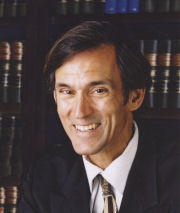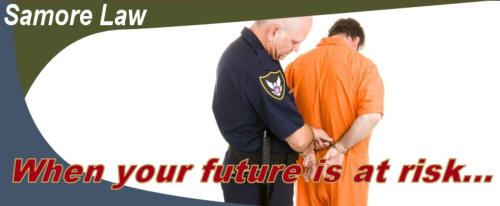

John Samore
Blog: Lawyer’s Insight on
Legal Matters:
- Recent Local/National Trials -
"Lawyer's Insight' is a periodic blog by Mr. Samore on
current legal issues that informs readers how current, legal
events influence Americans' lives. If you would like to ask
Mr. Samore to address a particular concern which you may
have, simply send an email to the address at left with
subject "Questions for Lawyer's Insight."
Click on the links below to quickly reach a particular topic,
or just scroll down to read what is of interest. Other
sources of information from Mr. Samore are on the
Common Questions and About Us pages of this website.
If you don’t see a link to a topic of interest, check the other Lawyer’s Insight pages.
Recent Local and National Trials
• Many Lessons of the Zimmerman (Trayvon Martin) Verdict in Florida • What are the lessons of the Levi Chavez Trial?Many Lessons of the Zimmerman (Trayvon Martin) Verdict in Florida
July 15, 2013 The trial of George Zimmerman was followed by millions on live television and newspapers, and many folks are quite stunned by the "no guilty"verdict on July 13. The events surrounding the trial contain many lessons that all of us, who want to better understand how criminal procedure works in real life, can consider. Deciding What Crime to Charge When an investigation comes to the Prosecutor, he or she must make a very important decision at the very outset of the case: what crime will the evidence support charging? In Mr. Zimmerman's case, an unarmed teenager he did not know was shot and killed at night with no real eyewitnesses. Many commentators (and the primary case investigator) thought the most severe crime of which he could be found guilty was "voluntary manslaughter," which means Mr. Z thought he was in danger but used more force than was really necessary to defend himself. The Prosecution here decided that it would charge second-degree murder" which requires proof of an additional element called "premediation." (First degree murder requires proof of "malice" and was never considered.) What Role Did Race Play? While we all would like to think we can put aside racial considerations, it would be very naive to think that race did not have a significant role in many aspects of how this case proceeded through the system. Even before the charges were filed against Mr. Z (many weeks after the incident), intense, nationwide attention had been focused on all the people involved. Many people assumed that, because Mr. Z had continued to follow Mr. M after being told by a police dispatcher to let the police handle it, that Mr. Z was a cold-blooded killer. Many other people assumed that Mr.Z was only defending himself when he felt his life threatened by the taller, younger man. Unfortunately, the decision to charge the more serious crime (also much more difficult to prove) may have also been influenced by race. In the days before charges were filed , the mayor and City Manager (I am not kidding) met with Trayvon's parents and, for the first time to the parents, played an audio recording of the two men fighting, only a few seconds before the fatal shot was fired. The Prosecutors later met and prayed with Trayvon's parents and attorney and, promptly thereafter, announced they were going to file the most serious charge of second-degree murder. How Important was the Jury to the Acquittal? Since the jury is supposed to be made up of people who know virtually nothing of the incident, it was challenging to find a jury. Even more surprising, Florida permits a jury of only six people to decide a criminal trial as long as it does not involve a possible death penalty. Based on conventional wisdom that the standard jury of twelve gives the Defense a greater prospect for a hung ("deadlocked") jury, this unique (no other state has it) provision seemed to favor the Prosecution. The jury was made of of six women (five of them white), a composition most commentators thought would favor the Prosecution, because many assumed that women (five mothers of the six) would identify more closely with the slain young man and his family. The reaction across the country, however, suggests that many people who were so quick to criticize the verdict did not consider all the difficult challenges the Prosecution faced in attempting to prove guilt. How Big a Role Did the Attorneys Play? Choice of attorneys is always a critical element of the results in any hotly-contested case, even if it does not go to trial. In this case, both sides had very capable attorneys, and, to the impartial observer, it appeared the cases were effectively presented. Certainly, both sides made mistakes (the wholly inappropriate knock-knock joke in the Defense opening statement will go down as one of the most monumentally stupid statements ever made in a courtroom), but that is inevitable in any trial. A real insight into the verdict is the fact neither side emphasized to the jury that they could acquit Mr. Z of the murder charge but still find him guilty of felony "manslaughter" which was also an option the judge gave the jury. Both sides decided to gamble by arguing only the murder charges and, from a question that the jurors interrupted their own deliberations to ask the judge, it was clear the jurors had some unresolved concern themselves.How Important is Florida Law to the Verdict?
A lot Florida has a unique, rather extreme law, commonly called "Stand Your Ground" which permits any citizen who feels someone is threatening, to use deadly force against that person, even if that person has actually stopped threatening and even started to back away. Long before this trial, quite a number of persons who had killed under every bit as extreme circumstances as this incident, had been acquitted by Florida juries or, more often, not even charged with any crime. The judges, attorneys, and investigators cannot change the law themselves; this is the exclusive responsibility of the legislature and governor. In order to use "stand your ground" as a defense, a preliminary hearing where the Defense has to justify the basis for this claim would have been conducted before the trial even began. The Defense attorneys decided that they did not want to risk Mr. Z probably having to testify at this hearing and themselves have to put on other evidence before the Prosecution put on its evidence at trial. They decided, instead, to just assert a standard claim of self-defense, which still requires the Prosecution to prove that the actions Mr. Z took were not simply because he felt he was being threatened with physical injury and needed to defend himself. If the jury believed that Mr. Z's fear was "reasonable," then actual injury inflicted by Trayvon was not even required to be shown in order to justify Mr. Z pulling the trigger. The verdict shows that the jury concluded Mr. Z's fear was reasonable and his use of force appropriate. Because the Prosecution did not really argue to the jury that the use of deadly force was excessive (often called "imperfect self-defense"), the jury did not seriously consider the lesser-included offense of voluntary manslaughter (which was, on the available evidence, a much stronger allegation). Was the verdict the correct result? No one will ever know, any more than anyone will really know was happened that dark, damp night between these two people. Only Mr. Z lives, and his memory may very clouded by the excitement (and perhaps fear) of that fateful night. His story was told to the jury through the replaying of his several post-incident statement , so he never had to actually testify under oath and be subject to cross-examination over his many inconsistencies. It is an unfortunate reality that courts of law, no matter how hard we all try, can never really determine what is "the truth." Courts can only reach a verdict on what is "provable." Do we need a "National Dialogue" on Race, as some of the people are requesting? Sure. Talking about any of this country's many serious problems might help. The problem here is that too many people are screaming that this case was decided solely on a racial basis when it is far more likely that it is a clear example of how criminal trials work in the real world. For example, a black woman, who is a third-year law student (after verifying to her satisfaction that Mr. Z was not a "racist"), volunteered her services to Mr. Z as a legal assistant throughout the trial. She was vigorously criticized throughout the trial by many black folks who claimed "she is on the wrong side of the courtroom and the wrong side of history." Let us all hope that, to the contrary, by not being blinded herself to a the limitations of racial expectation, she is on the "right side of history." Let us hope we are all closer to a day when difficult cases such as this do not become a racial flashpoint and all people can make personal decisions that are not defined by the color of their skin. more about violent crimesWhat are the lessons of the Levi Chavez Trial?
July 15, 2013 If it were not for the Zimmerman-Martin trial in Florida the prior month, the nation's (legal-oriented) television cameras may have been focused this past month just to the north of Albuquerque in the murder trial in Bernalillo of former Albuquerque Police officer Levi Chavez. The allegations arising from the 2007 homicide death of his wife Tera are really quite spectacular and the lead up to the trial and the five-week trial itself has riveted the attention of many folks. As this column is written, the evidence has been presented, the jury is deliberating toward a verdict. Even now, we can also learn from this trial important lessons as to how our system works (and doesn't work). Can front-page newspaper and television coverage effect the result? The huge play given this case certainly encourages us to develop opinions, but none of us know what the jury finds impressive. The jury could have been "sequestered," which means that, from the time the trial began, the jurors would have been living in a local hotel (at Government expense) at all times that court was not in session. Except for limited contact, they would have been isolated from their families. The jurors have, instead, been permitted to go home each night and risk being exposed to television and newspaper coverage or being influenced by comments from their family and friends. The judge has properly reminded them every night not to look at TV, read articles, or even get on the internet to find information on things that might help them better understand the evidence presented. This is a tall order; no one can really guarantee that they are really respecting his directions. They could even accidentally be exposed to a stray comment from someone who does not even know who they are that could (regrettably) influence their thinking. We can only hope that the final verdict -- either way -- is based on the evidence and not prejudice. How does a jury avoid personal feelings when weighing the evidence? Staying objective is a real challenge to any jury, especially when the Prosecution and Defense have unavoidably discussed the defendant's long history of marital infidelities. Mr. Chavez has claimed that he was with a fellow officer and also with one of his many girlfriends at the time critical events occurred, while the Prosecution understandably considers his behaviors to be one of several reasons he wanted to kill Tera. Since most of us have, directly or through family or friends, had experience with marital infidelity, it may prove difficult for a juror not to let personal feelings effect objectivity. it is very important to remember that Mr. Chavez is not being prosecuted for a being poor husband but for being a murderer. Were there problems with the evidence? It was the State's sole responsibility to prove guilt; the Defense simply insisted that the evidence did not prove guilt "beyond a reasonable doubt." As they often do, the State admitted their case was not perfect but asked jurors to use their common sense and not overreach to find "doubt." The Defense usually counters that "common sense" is not evidence. One of the more unsettling Prosecution problems was the experienced pathologist who performed the autopsy concluded in her original report that the cause of death was "suicide." She later changed her conclusion, without any further physical examination or diagnostic evidence, that the cause of death was "undetermined." When asked by Defense counsel to explain the reason she changed her conclusion, all she could offer was that she was told by investigators that it was not a suicide. To make such a significant change in a report for no more reason than being told to do so is simply a violation of medical standards. Another problem was that the chief investigator who really pushed building a case for a murder prosecution was a gentleman who has had many other problems on other cases and lost jobs, which permitted the Defense to claim he was a "dirty" (as in "corrupt") cop and should not be believed. Whether this investigator's problems on other jobs causes the jury to discount some of his very critical testimony that could help convict Mr. Chavez will be resolved by the jury. A third problem was that, because the initial investigation was undeniably sloppy, Tera's fingernails were not checked for Levi's DNA, which might have indicated if any physical contact had occurred before the fatal shot was fired. Facing some solid ballistics forensic, the Defense had to claim that Tera must have held the gun upside down when she shot herself and had no real explanation as to how the discharged Glock could have re-seated itself (when Tera would have been dead instantly), other than to assert that the cop who noticed this was in error, corrupt, or both. While calling the defendant to testify may have been a stroke of genius, Mr. Chavez again appeared to cry before the jury in the same artificial way that he was remembered by other officers doing during the investigation in the weeks after Tera's death. Whether his frequent, volunteered references to his Catholic faith and steadily squeezing rosary beads impressed the jury favorably remains to be seen. Can attorney behavior effect the result? No matter how much we would like to pretend otherwise, of course it can. Many attorneys believe a verdict is largely settled just by who has been chosen for the jury and what the jury's first impression is of the case, once they have heard the Opening Statements of each side. If true, this would be very unfortunate, because only AFTER Opening Statement, does the presentation of any evidence even begin. One particular incident has stuck with many courtroom observers and whether it effects the result may only be known by the verdict: During the defendant's testimony, the two prosecutors were twice admonished by the Judge not to snicker or laugh during his testimony. If true, this conduct is truly shocking, because these are experienced prosecutors who had done a commendable job of presenting their case. Such unprofessional behavior could only diminish their image, insult the jury, and benefit the Defense. No matter how preposterous any witness' testimony may be, no attorney should ever be seen by the jury mocking any witness. Let the jury decide whether the witness should be believed. Does the verdict end the controversy? Whether the jury returns "guilty," "not guilty," or cannot reach a verdict, this case is one which will be vigorously discussed in New Mexico for fifty years. Does this case undermine our confidence in APD? The local police are now under federal investigation for alleged civil rights violations that have occurred over more than a decade, and this case has certainly done its tarnished image no favors. Many of Mr. Chavez's female lovers were also APD officers, several of whom struggled in trial testimony to explain their conduct. We all should have long ago recognized, however, that being a cop anywhere is one of the more daunting challenges to any marriage.



John Samore
Blog: Lawyer’s Insight on
Legal Matters:
- Recent Local/National Trials -
"Lawyer's Insight' is a periodic blog by Mr. Samore
on current legal issues that
informs readers how current,
legal events influence
Americans' lives. If you would
like to ask Mr. Samore to
address a particular concern
which you may have, simply
send an email to the address at
left with subject "Questions for
Lawyer's Insight."
Click on the links below to quickly reach a particular
topic, or just scroll down to read what is of interest.
Other sources of information from Mr. Samore are on
the Common Questions and About Us pages of this
website.
If you don’t see a link to a topic of interest, check the
other Lawyer’s Insight pages.
Recent Local and National Trials
• Many Lessons of the Zimmerman (Trayvon Martin) Verdict in Florida • What are the lessons of the Levi Chavez Trial?Many Lessons of the Zimmerman (Trayvon Martin)
Verdict in Florida
July 15, 2013 The trial of George Zimmerman was followed by millions on live television and newspapers, and many folks are quite stunned by the "no guilty"verdict on July 13. The events surrounding the trial contain many lessons that all of us, who want to better understand how criminal procedure works in real life, can consider. Deciding What Crime to Charge When an investigation comes to the Prosecutor, he or she must make a very important decision at the very outset of the case: what crime will the evidence support charging? In Mr. Zimmerman's case, an unarmed teenager he did not know was shot and killed at night with no real eyewitnesses. Many commentators (and the primary case investigator) thought the most severe crime of which he could be found guilty was "voluntary manslaughter," which means Mr. Z thought he was in danger but used more force than was really necessary to defend himself. The Prosecution here decided that it would charge second-degree murder" which requires proof of an additional element called "premediation." (First degree murder requires proof of "malice" and was never considered.) What Role Did Race Play? While we all would like to think we can put aside racial considerations, it would be very naive to think that race did not have a significant role in many aspects of how this case proceeded through the system. Even before the charges were filed against Mr. Z (many weeks after the incident), intense, nationwide attention had been focused on all the people involved. Many people assumed that, because Mr. Z had continued to follow Mr. M after being told by a police dispatcher to let the police handle it, that Mr. Z was a cold-blooded killer. Many other people assumed that Mr.Z was only defending himself when he felt his life threatened by the taller, younger man. Unfortunately, the decision to charge the more serious crime (also much more difficult to prove) may have also been influenced by race. In the days before charges were filed , the mayor and City Manager (I am not kidding) met with Trayvon's parents and, for the first time to the parents, played an audio recording of the two men fighting, only a few seconds before the fatal shot was fired. The Prosecutors later met and prayed with Trayvon's parents and attorney and, promptly thereafter, announced they were going to file the most serious charge of second-degree murder. How Important was the Jury to the Acquittal? Since the jury is supposed to be made up of people who know virtually nothing of the incident, it was challenging to find a jury. Even more surprising, Florida permits a jury of only six people to decide a criminal trial as long as it does not involve a possible death penalty. Based on conventional wisdom that the standard jury of twelve gives the Defense a greater prospect for a hung ("deadlocked") jury, this unique (no other state has it) provision seemed to favor the Prosecution. The jury was made of of six women (five of them white), a composition most commentators thought would favor the Prosecution, because many assumed that women (five mothers of the six) would identify more closely with the slain young man and his family. The reaction across the country, however, suggests that many people who were so quick to criticize the verdict did not consider all the difficult challenges the Prosecution faced in attempting to prove guilt. How Big a Role Did the Attorneys Play? Choice of attorneys is always a critical element of the results in any hotly-contested case, even if it does not go to trial. In this case, both sides had very capable attorneys, and, to the impartial observer, it appeared the cases were effectively presented. Certainly, both sides made mistakes (the wholly inappropriate knock-knock joke in the Defense opening statement will go down as one of the most monumentally stupid statements ever made in a courtroom), but that is inevitable in any trial. A real insight into the verdict is the fact neither side emphasized to the jury that they could acquit Mr. Z of the murder charge but still find him guilty of felony "manslaughter" which was also an option the judge gave the jury. Both sides decided to gamble by arguing only the murder charges and, from a question that the jurors interrupted their own deliberations to ask the judge, it was clear the jurors had some unresolved concern themselves.How Important is Florida Law to the Verdict?
A lot Florida has a unique, rather extreme law, commonly called "Stand Your Ground" which permits any citizen who feels someone is threatening, to use deadly force against that person, even if that person has actually stopped threatening and even started to back away. Long before this trial, quite a number of persons who had killed under every bit as extreme circumstances as this incident, had been acquitted by Florida juries or, more often, not even charged with any crime. The judges, attorneys, and investigators cannot change the law themselves; this is the exclusive responsibility of the legislature and governor. In order to use "stand your ground" as a defense, a preliminary hearing where the Defense has to justify the basis for this claim would have been conducted before the trial even began. The Defense attorneys decided that they did not want to risk Mr. Z probably having to testify at this hearing and themselves have to put on other evidence before the Prosecution put on its evidence at trial. They decided, instead, to just assert a standard claim of self-defense, which still requires the Prosecution to prove that the actions Mr. Z took were not simply because he felt he was being threatened with physical injury and needed to defend himself. If the jury believed that Mr. Z's fear was "reasonable," then actual injury inflicted by Trayvon was not even required to be shown in order to justify Mr. Z pulling the trigger. The verdict shows that the jury concluded Mr. Z's fear was reasonable and his use of force appropriate. Because the Prosecution did not really argue to the jury that the use of deadly force was excessive (often called "imperfect self-defense"), the jury did not seriously consider the lesser-included offense of voluntary manslaughter (which was, on the available evidence, a much stronger allegation). Was the verdict the correct result? No one will ever know, any more than anyone will really know was happened that dark, damp night between these two people. Only Mr. Z lives, and his memory may very clouded by the excitement (and perhaps fear) of that fateful night. His story was told to the jury through the replaying of his several post- incident statement , so he never had to actually testify under oath and be subject to cross- examination over his many inconsistencies. It is an unfortunate reality that courts of law, no matter how hard we all try, can never really determine what is "the truth." Courts can only reach a verdict on what is "provable." Do we need a "National Dialogue" on Race, as some of the people are requesting? Sure. Talking about any of this country's many serious problems might help. The problem here is that too many people are screaming that this case was decided solely on a racial basis when it is far more likely that it is a clear example of how criminal trials work in the real world. For example, a black woman, who is a third-year law student (after verifying to her satisfaction that Mr. Z was not a "racist"), volunteered her services to Mr. Z as a legal assistant throughout the trial. She was vigorously criticized throughout the trial by many black folks who claimed "she is on the wrong side of the courtroom and the wrong side of history." Let us all hope that, to the contrary, by not being blinded herself to a the limitations of racial expectation, she is on the "right side of history." Let us hope we are all closer to a day when difficult cases such as this do not become a racial flashpoint and all people can make personal decisions that are not defined by the color of their skin. more about violent crimesWhat are the lessons of the Levi Chavez Trial?
July 15, 2013 If it were not for the Zimmerman-Martin trial in Florida the prior month, the nation's (legal-oriented) television cameras may have been focused this past month just to the north of Albuquerque in the murder trial in Bernalillo of former Albuquerque Police officer Levi Chavez. The allegations arising from the 2007 homicide death of his wife Tera are really quite spectacular and the lead up to the trial and the five-week trial itself has riveted the attention of many folks. As this column is written, the evidence has been presented, the jury is deliberating toward a verdict. Even now, we can also learn from this trial important lessons as to how our system works (and doesn't work). Can front-page newspaper and television coverage effect the result? The huge play given this case certainly encourages us to develop opinions, but none of us know what the jury finds impressive. The jury could have been "sequestered," which means that, from the time the trial began, the jurors would have been living in a local hotel (at Government expense) at all times that court was not in session. Except for limited contact, they would have been isolated from their families. The jurors have, instead, been permitted to go home each night and risk being exposed to television and newspaper coverage or being influenced by comments from their family and friends. The judge has properly reminded them every night not to look at TV, read articles, or even get on the internet to find information on things that might help them better understand the evidence presented. This is a tall order; no one can really guarantee that they are really respecting his directions. They could even accidentally be exposed to a stray comment from someone who does not even know who they are that could (regrettably) influence their thinking. We can only hope that the final verdict -- either way -- is based on the evidence and not prejudice. How does a jury avoid personal feelings when weighing the evidence? Staying objective is a real challenge to any jury, especially when the Prosecution and Defense have unavoidably discussed the defendant's long history of marital infidelities. Mr. Chavez has claimed that he was with a fellow officer and also with one of his many girlfriends at the time critical events occurred, while the Prosecution understandably considers his behaviors to be one of several reasons he wanted to kill Tera. Since most of us have, directly or through family or friends, had experience with marital infidelity, it may prove difficult for a juror not to let personal feelings effect objectivity. it is very important to remember that Mr. Chavez is not being prosecuted for a being poor husband but for being a murderer. Were there problems with the evidence? It was the State's sole responsibility to prove guilt; the Defense simply insisted that the evidence did not prove guilt "beyond a reasonable doubt." As they often do, the State admitted their case was not perfect but asked jurors to use their common sense and not overreach to find "doubt." The Defense usually counters that "common sense" is not evidence. One of the more unsettling Prosecution problems was the experienced pathologist who performed the autopsy concluded in her original report that the cause of death was "suicide." She later changed her conclusion, without any further physical examination or diagnostic evidence, that the cause of death was "undetermined." When asked by Defense counsel to explain the reason she changed her conclusion, all she could offer was that she was told by investigators that it was not a suicide. To make such a significant change in a report for no more reason than being told to do so is simply a violation of medical standards. Another problem was that the chief investigator who really pushed building a case for a murder prosecution was a gentleman who has had many other problems on other cases and lost jobs, which permitted the Defense to claim he was a "dirty" (as in "corrupt") cop and should not be believed. Whether this investigator's problems on other jobs causes the jury to discount some of his very critical testimony that could help convict Mr. Chavez will be resolved by the jury. A third problem was that, because the initial investigation was undeniably sloppy, Tera's fingernails were not checked for Levi's DNA, which might have indicated if any physical contact had occurred before the fatal shot was fired. Facing some solid ballistics forensic, the Defense had to claim that Tera must have held the gun upside down when she shot herself and had no real explanation as to how the discharged Glock could have re-seated itself (when Tera would have been dead instantly), other than to assert that the cop who noticed this was in error, corrupt, or both. While calling the defendant to testify may have been a stroke of genius, Mr. Chavez again appeared to cry before the jury in the same artificial way that he was remembered by other officers doing during the investigation in the weeks after Tera's death. Whether his frequent, volunteered references to his Catholic faith and steadily squeezing rosary beads impressed the jury favorably remains to be seen. Can attorney behavior effect the result? No matter how much we would like to pretend otherwise, of course it can. Many attorneys believe a verdict is largely settled just by who has been chosen for the jury and what the jury's first impression is of the case, once they have heard the Opening Statements of each side. If true, this would be very unfortunate, because only AFTER Opening Statement, does the presentation of any evidence even begin. One particular incident has stuck with many courtroom observers and whether it effects the result may only be known by the verdict: During the defendant's testimony, the two prosecutors were twice admonished by the Judge not to snicker or laugh during his testimony. If true, this conduct is truly shocking, because these are experienced prosecutors who had done a commendable job of presenting their case. Such unprofessional behavior could only diminish their image, insult the jury, and benefit the Defense. No matter how preposterous any witness' testimony may be, no attorney should ever be seen by the jury mocking any witness. Let the jury decide whether the witness should be believed. Does the verdict end the controversy? Whether the jury returns "guilty," "not guilty," or cannot reach a verdict, this case is one which will be vigorously discussed in New Mexico for fifty years. Does this case undermine our confidence in APD? The local police are now under federal investigation for alleged civil rights violations that have occurred over more than a decade, and this case has certainly done its tarnished image no favors. Many of Mr. Chavez's female lovers were also APD officers, several of whom struggled in trial testimony to explain their conduct. We all should have long ago recognized, however, that being a cop anywhere is one of the more daunting challenges to any marriage.




































